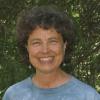What I see is a world hurtling toward self-destruction.
The human community faces its largest crisis it has ever faced
in our long, evolutionary history.
We call this crisis “climate change.”
- Dominican Sister Claire McGowan, addressing the LCWR 2014 National Assembly
We commit ourselves to use our spiritual, social, and educational resources
and our public credibility to promote the national transition from fossil fuel
energy resources as quickly as possible.
- Resolution, LCWR National Assembly, 2014
She’s failing. It’s caused by a diagnosis that qualifies her for hospice care: COPD. The letters mean nothing to me. But I can see she’s not getting the air she needs for her usual energetic life. That means everything to me. I travel from my Wyoming home to Cincinnati where she lives in my sister’s home to be with her regularly.
I help organize my mother’s doctor appointments, pick up meds, coax menus that appeal to her and buy groceries. I sit with her as she dozes in her recliner in the living room, facing a window full of flowers we planted together. She joins me in the mornings for the fresh air of the garden, praying her rosary as I gather myself for the day.
Today it’s meatloaf, and I’m chopping onion and celery, fine as possible. She usually blends them in a food processor. This time, Mom lets me do it my way. “You’re a good cook,” she says at dinner. “May I suggest that next time you do it my way?”
Essence of spiritual practice.
Climate change is all about air, about the atmosphere that sustains almost all life in our common home, Earth. We live within the world of air, “the sweet mothering air,” wrote Gerald Manley Hopkins. “Breathe in the living Jesus,” we recall the Easter message as we pray. Breathe within the received Spirit of hope.
I walk with Sachiko, my friend from Japan, along Prune Creek in the Bighorn Mountains. The air is thin, swept sparkling by recent rain. She pulls at it gratefully. She lives in an industrial city and repeatedly says how much she’s enjoying the clean air.
We’ve already surpassed the 350 parts per million, the carbon count deemed the tipping point into climate disaster. Statistics.
In the Bighorns, drought is weakening thick pine forests that clothe the long slopes. Drought stressed trees cannot fend off mountain pine beetles, which feed on the living layer beneath bark, killing the trees. The slopes are striated with rust-colored dead trees, awaiting forest fire. The beetle epidemic has killed more than 70,000 square miles of trees throughout the mountain west. Not statistics.
Higher up, along the trail that leads to an ancient pilgrimage site, the Bighorn Medicine Wheel, pika chirp alarm from hiding places in limestone talus. If you’re lucky, you might catch a glimpse of one.
National Wildlife Federation describes them: “With round bodies, prominent ears, no visible tail and weighing just 5 ounces, pikas are unmercifully cute.” They live at 10,000 feet. Their life cycle is timed to that of seed bearing plants, whose cycles are in rhythm with the seasons. Earlier springs mean the plants flower and go to seed sooner. This earlier aging of vegetation may mean increased stress for pikas, especially if they are raising families.
Pikas can die if exposed to temperatures as mild as 78 degrees. Once they reach the top of their mountain habitat, they have nowhere else to go. Not statistics.
We know about sea levels rising, endangering coastal populations. We know about super storms, heat that kills vulnerable human populations, the increase in asthma in children who live near power plants and how fracking endangers water purity.
Not statistics.
This is why practices that break our addiction to fossil fuels become spiritual practice. They are life-saving practices of hope. They are Easter Jesus practices.
Lowering thermostats in winter, shifting budgets to thoroughly insulate homes and install solar and wind power, observing the old 55 mph, lobbying for stricter air quality standards: all life saving. They are today’s spiritual discipline, holy practices that reverence the sacred Earth community.
This time, Earth suggests, please do it my way.
[An Oldenburg Franciscan Sister since 1963, Marya Grathwohl lived for more than 30 years in African American, Crow and Northern Cheyenne communities, as teacher, principal and pastoral minister. She is the founding director of Earth Hope, and works in environmental restoration through farming, restoration and other ecology projects.]
